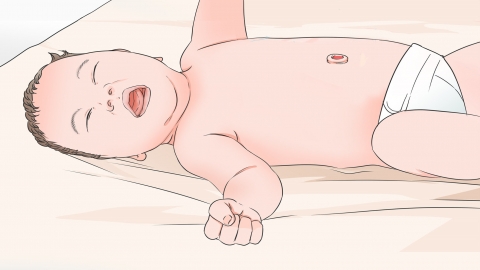What Could Be the Possible Causes of Severe Wheezing in Newborns?
Severe wheezing in newborns may be caused by underdeveloped respiratory systems, improper feeding posture, respiratory tract infections, congenital laryngeal cartilage dysplasia, or bronchial asthma. Management depends on the specific situation. It is recommended that parents promptly take the infant to the hospital for diagnosis and follow medical advice for appropriate treatment.

1. Underdeveloped Respiratory System: The respiratory system of a newborn may not be fully mature, with weak respiratory muscles and unstable breathing rhythm, which can lead to rapid breathing and wheezing. Symptoms include noticeable chest movement and breathing rates higher than normal. Usually, no special treatment is required; wheezing typically improves as the respiratory system matures with growth. It is important to maintain fresh and appropriately temperate indoor air.
2. Improper Feeding Posture: Incorrect feeding posture, such as lying the infant flat while bottle-feeding, may cause milk to enter the trachea, leading to choking and wheezing. The infant may suddenly choke, cough violently, and breathe rapidly. Correct feeding posture—such as holding the infant semi-upright—is recommended. Burping the infant upright after feeding can help reduce the risk of choking.
3. Respiratory Tract Infection: Due to low immunity, newborns are susceptible to viral or bacterial invasion of the respiratory tract, causing inflammation, mucosal congestion, edema, and airway narrowing, which may lead to wheezing. Symptoms may include fever, coughing, and runny nose. It is recommended that infants be given medications such as Pediatric Paracetamol, Pseudoephedrine, and Chlorpheniramine Granules, Ambroxol and Clenbuterol Oral Solution, or Cefixime Granules under medical guidance to alleviate symptoms.
4. Congenital Laryngeal Cartilage Dysplasia: Deficiencies in nutrients such as calcium and vitamin D during fetal development can lead to incomplete laryngeal cartilage development, causing airway collapse and wheezing during inhalation. Symptoms often appear shortly after birth, including noisy breathing during inhalation, which may worsen during activity or crying. It is recommended that infants be given medications such as Calcium Gluconate Oral Solution, Oyster Shell Calcium Carbonate Granules, or Calcium Carbonate Tablets under medical guidance to relieve discomfort.
5. Bronchial Asthma: A combination of genetic and environmental factors may cause chronic airway inflammation in newborns. When exposed to allergens, the airways may spasm, causing wheezing. Symptoms include rapid breathing, noticeable wheezing, and audible wheezing sounds in the lungs during an attack. Patients may use medications such as Salbutamol Aerosol, Budesonide Inhalation Suspension, or Montelukast Sodium Granules under medical supervision for treatment.
In daily life, parents should maintain suitable indoor temperature and humidity, avoid smoke and air pollution, and provide oxygen support if necessary to assist the infant's breathing.
References:
[1] Zhang Lei, Zhang Lu, Tang Jianping. "Effectiveness and safety of HHHFNC in treating neonatal MAS complicated with type I respiratory failure." China Practical Medicine, 2021, 16(17): 34-36.
[2] Zhou Hongyan, Wang Jinya, Wang Ji. "Impact of neonatal respiratory scores combined with continuous positive airway pressure ventilation on blood gas indices and chest radiographs in neonates with respiratory distress syndrome." Chinese Journal of Women and Children's Health, 2025, 40(06): 1037-1041.




